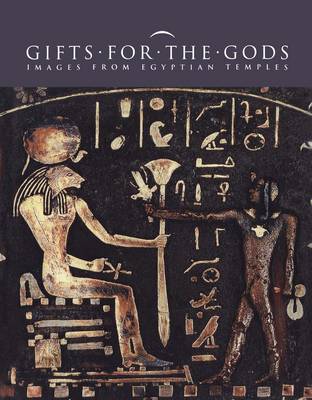Metropolitan Museum of Art
1 total work
Gifts for the Gods
Published 26 November 2007
Throughout their long history, the ancient Egyptians crafted luminous statues of bronze, copper, silver, and gold for use in interactions with their gods-from ritual dramas enacted in the inner sanctuaries of temples to festival processions and celebrations attended by the multitudes. This volume, which accompanies an exhibition at The Metropolitan Museum of Art, is the first to focus on the art and significance of Egyptian metal statuary. Marshaling fresh insights to present a new appreciation of this lustrous work, the authors trace continuities in the development of the statuary, illuminate how its production was integrated within artistic and social structures, and examine its potential role in ritual practice.
Metal statuary offers a surprising view of Egyptian art because the cultural, social, and manufacturing networks from which it emerged were often different from those that produced stone statuary, the more familiar artistic expression of ancient Egypt. In the presence of these extraordinary images of gods and pious individuals, the temples, in particular, emerge as crucibles in which diverse influences came together to replenish the art and beliefs of Egyptian society. The superb statues and statuettes illustrated in this volume were made in a variety of precious metals and copper alloys over a span of some two millennia. Especially dramatic are those from the Third Intermediate Period (ca. 1070-664 B.C.), an era whose conventional name belies its great artistic accomplishment. The splendid statuary from this period, the apogee of the Egyptian metalworking tradition, is perhaps best represented by the sumptuous figure of a priestess and noblewoman named "Takushit," whose entire body surface is covered with texts and depictions of gods intricately inlaid with thin strips of precious metal.
Also included in this volume are two essays on recent archaeological discoveries that shed light on poorly understood aspects of Egyptian metal statuary. These reports on excavations at the Sacred Animal Necropolis in North Saqqara and at the village of 'Ayn Manawir in the Kharga Oasis yield insight into the practices surrounding temple statuary, notably that these works were provided by donors for actual use in the temple and, after many years of service, reverently decommissioned and buried in large caches. The final essay explores and explains the intricate technological aspects of Egyptian metal statuary as an integral part of its unique appeal. The technical descriptions provided for each work are thus as precise, detailed and consistent in terminology as possible-crucial considerations for a field of sculptural studies in which accurate information about manufacture and material is inextricably linked to an appreciation of the artistry and history of the medium. [This book was originally published in 2007 and has gone out of print. This edition is a print-on-demand version of the original book.]
Metal statuary offers a surprising view of Egyptian art because the cultural, social, and manufacturing networks from which it emerged were often different from those that produced stone statuary, the more familiar artistic expression of ancient Egypt. In the presence of these extraordinary images of gods and pious individuals, the temples, in particular, emerge as crucibles in which diverse influences came together to replenish the art and beliefs of Egyptian society. The superb statues and statuettes illustrated in this volume were made in a variety of precious metals and copper alloys over a span of some two millennia. Especially dramatic are those from the Third Intermediate Period (ca. 1070-664 B.C.), an era whose conventional name belies its great artistic accomplishment. The splendid statuary from this period, the apogee of the Egyptian metalworking tradition, is perhaps best represented by the sumptuous figure of a priestess and noblewoman named "Takushit," whose entire body surface is covered with texts and depictions of gods intricately inlaid with thin strips of precious metal.
Also included in this volume are two essays on recent archaeological discoveries that shed light on poorly understood aspects of Egyptian metal statuary. These reports on excavations at the Sacred Animal Necropolis in North Saqqara and at the village of 'Ayn Manawir in the Kharga Oasis yield insight into the practices surrounding temple statuary, notably that these works were provided by donors for actual use in the temple and, after many years of service, reverently decommissioned and buried in large caches. The final essay explores and explains the intricate technological aspects of Egyptian metal statuary as an integral part of its unique appeal. The technical descriptions provided for each work are thus as precise, detailed and consistent in terminology as possible-crucial considerations for a field of sculptural studies in which accurate information about manufacture and material is inextricably linked to an appreciation of the artistry and history of the medium. [This book was originally published in 2007 and has gone out of print. This edition is a print-on-demand version of the original book.]
